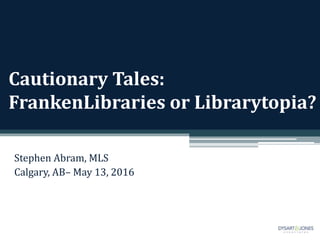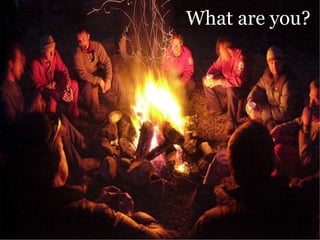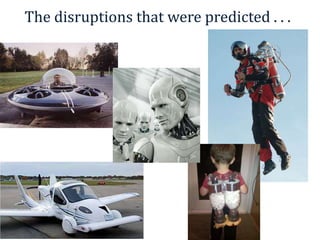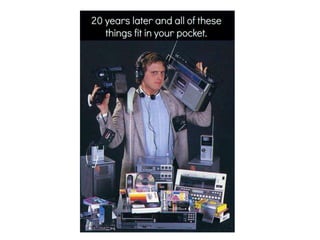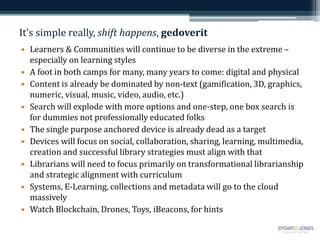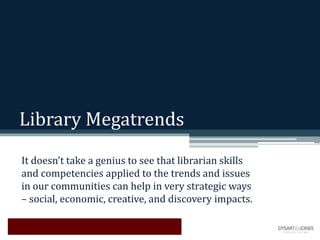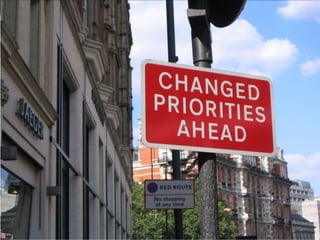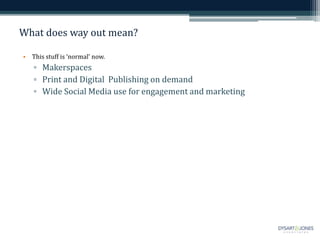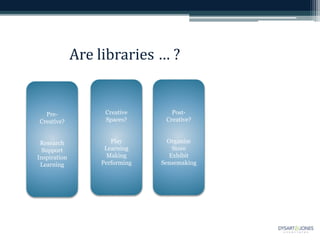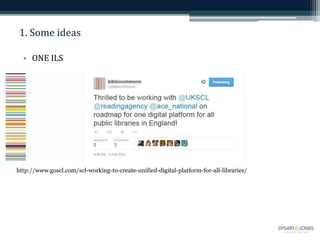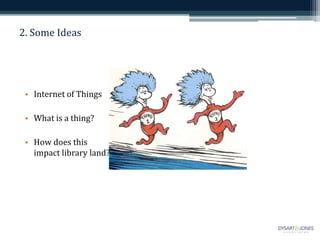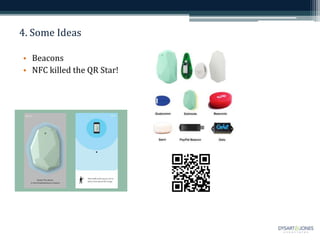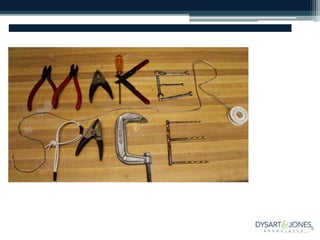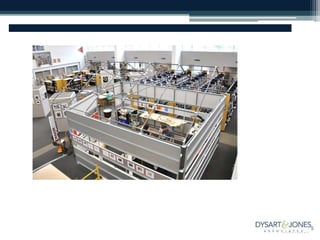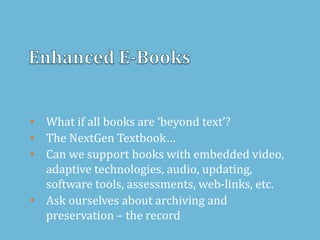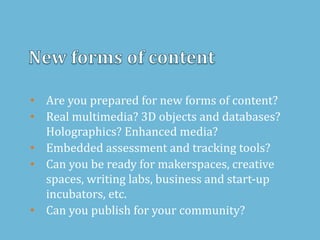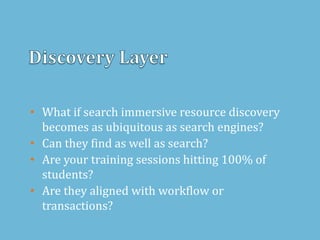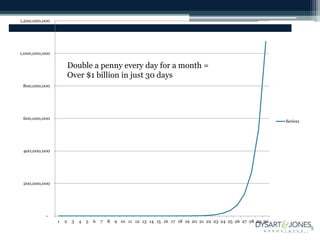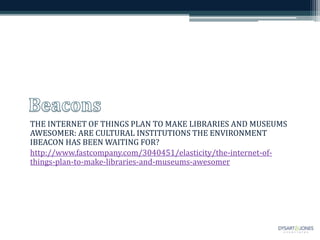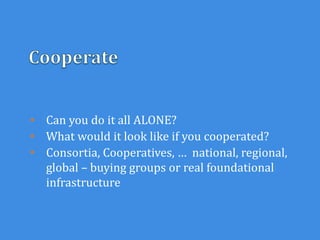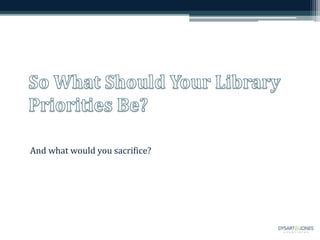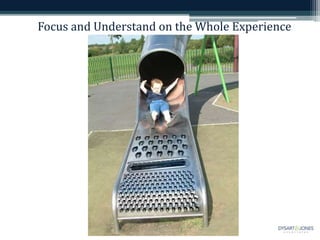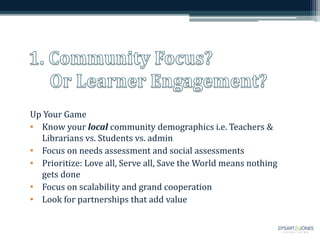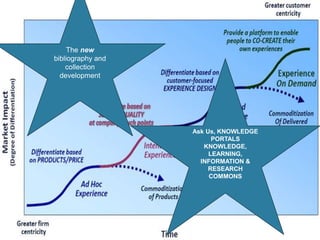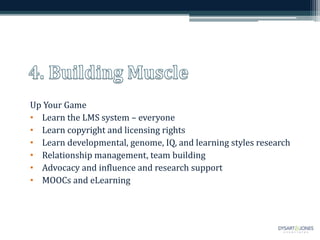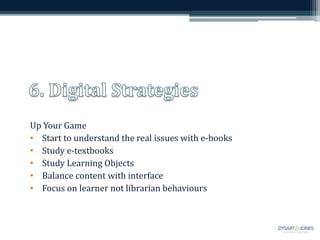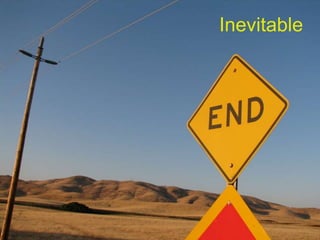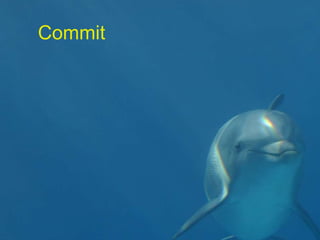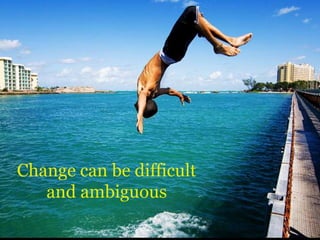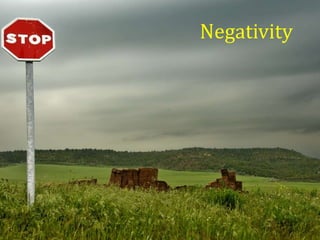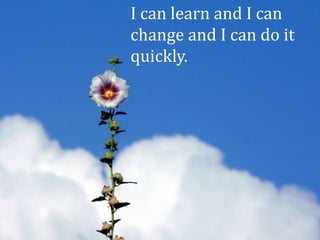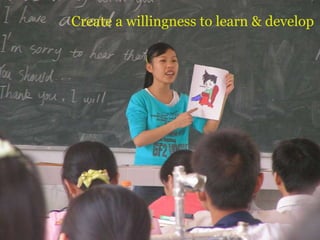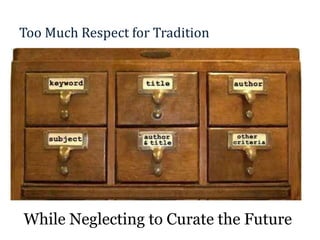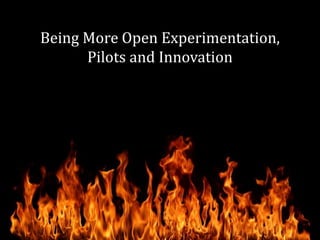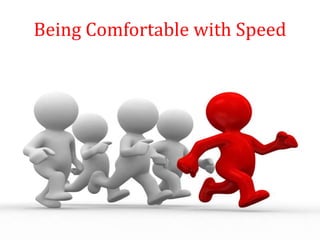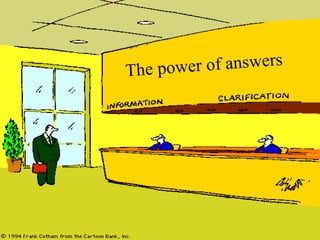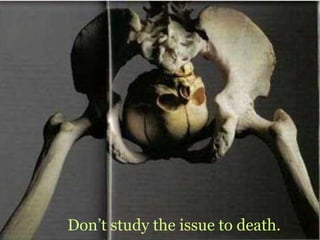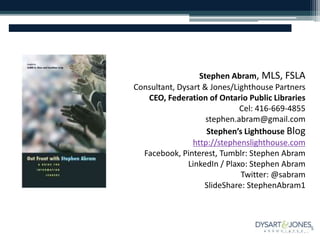Aalt
- 1. Cautionary Tales: FrankenLibraries or Librarytopia? Stephen Abram, MLS Calgary, AB– May 13, 2016
- 2. Every Day in every way libraries are throwing pebbles
- 3. What business are you in?
- 4. What Public Libraries Say They Mean - Missions
- 5. The Role of Questions
- 6. Books, eBooks Magazines Websites Buildings Rooms Desks Stations Programs Nouns can be warehoused and ‘cut’ Serve Answer Engage Link Entertain Tell a story Teach Create Do Action verbs imply dynamism and impact
- 7. YOU
- 9. Strategy and Direction Planning
- 11. 11
- 12. 12
- 13. 13 Who are you?
- 14. 14 What are you?
- 15. Black & White
- 20. 20
- 22. My son: Zachary
- 30. The disruptions that were predicted . . . 30
- 31. 31
- 33. Can everyone source their force? Can we contribute to everyone’s self-actualization? 33
- 34. Print was complicated too
- 35. It’s simple really, shift happens, gedoverit • Learners & Communities will continue to be diverse in the extreme – especially on learning styles • A foot in both camps for many, many years to come: digital and physical • Content is already be dominated by non-text (gamification, 3D, graphics, numeric, visual, music, video, audio, etc.) • Search will explode with more options and one-step, one box search is for dummies not professionally educated folks • The single purpose anchored device is already dead as a target • Devices will focus on social, collaboration, sharing, learning, multimedia, creation and successful library strategies must align with that • Librarians will need to focus primarily on transformational librarianship and strategic alignment with curriculum • Systems, E-Learning, collections and metadata will go to the cloud massively • Watch Blockchain, Drones, Toys, iBeacons, for hints
- 36. Library Megatrends It doesn’t take a genius to see that librarian skills and competencies applied to the trends and issues in our communities can help in very strategic ways – social, economic, creative, and discovery impacts.
- 37. Public Libraries • Are you a librarian or an educator? • Are you a support or mission-critical? • Your business is community impact and learning (they’re different) • Your new competitors are non-traditional • Renewed advocacy has moved from apple pie to influencing and selling the value and impact of libraries • Library staff competencies need a plateau upgrade – consultation, relationship, influence, educating . . .
- 41. Deer in headlamps slide here.
- 43. Libraries core skill is not delivering information Libraries improve the quality of the question and the user experience Learning Libraries are about building life competencies
- 44. Library Magic What are your magic tricks?
- 46. Failure to Reward Risk
- 47. Digital risk has raised the bar on risk taking in library land.
- 48. Librarianship Culture Avoiding the triple diseases of: 1. Conflict avoidance 2. Passive resistance 3. Risk aversion
- 49. Smelly Yellow Liquid Or Sex Appeal? The Complex Value Proposition
- 50. Are you locked into an old library mindset?
- 51. A Verb . . . an Experience, enlivened for an audience
- 52. A Noun . . . A foundation but not sufficient with professional animation
- 53. Grocery Stores
- 54. Cookbooks, Chefs . . .
- 55. Cookbooks, Chefs . . .
- 56. Meals
- 58. Library Land What changes, disruptions and shifts are already in the environment?
- 59. What does way out mean? • Normal means that enough libraries have adopted and are learning by doing that the adoption curve is well launched.
- 61. What does way out mean? • This stuff is ‘normal’ now. ▫ Makerspaces ▫ Print and Digital Publishing on demand ▫ Wide Social Media use for engagement and marketing
- 63. The Flavours of Makerspaces • http://oedb.org/ilibrarian/4-flavors-makerspaces/ • FabLabs • Hackerspaces • TechShops • Makerspaces • Bakerspaces • Writing Labs – Poetry Slams, Lyrics, NaNoWriMo • Art Shows: ArtSpaces • Music: PerformanceSpaces
- 64. 1. Some ideas • ONE ILS http://www.goscl.com/scl-working-to-create-unified-digital-platform-for-all-libraries/
- 65. 2. Some Ideas • Internet of Things • What is a thing? • How does this impact library land?
- 66. 3. Some ideas • Truly disrupting the BOOK codex • Are we at phase one of digital books where we merely create a digital version of the Gutenberg Codex? • 3 dimensional text, type, leading, spines, ears and feet. • Audio, video, • Interactivity with the server, community, other readers, classmates… • Create your own path… • Add yourself into the story – fan readers versus fan fiction…
- 67. 4. Some Ideas • Beacons • NFC killed the QR Star!
- 68. Librarybox.com
- 69. 5. Some Ideas • Big Data, Little Data • Insights from Aggregated and Anonymized Data Patterns • Very few libraries have truly BIG data but many of our vendors do. • Can this be the end of handcrafted book choices? Newspapers? POV periodicals? Albums? Scholarly festschrifts?
- 70. Snapchat and their Plans At launch, Snapchat is working with ten media partners, including CNN, ESPN, and National Geographic. These companies will release a new edition of Discover content every 24 hours, featuring both videos and articles hand picked by their staffers. The goal for these media companies, of course, is to hook a new, younger audience that doesn’t often connect with traditional media. http://www.niemanlab.org/2015/01/snapchats-new-discover-feature-could-be-a-significant-moment-in-the-evolution-of-mobile-news/
- 71. 6. Some ideas • Marketing Disruption • Instagram • Facebook • 20 Ways to Make People Fall in Love With Your Instagram: A Guide for Libraries and Other Cultural Institutions • http://www.nypl.org/blog/2014/12/23/20-ways-make-people-fall- love-your-instagram-guide-libraries-and-other-cultural • And more on Stephen’s Lighthouse
- 72. 7. Some ideas • Payment Systems • Selling and Charging and Leading • Square, PayPal, • Debit cards as library card
- 73. 8. Some ideas • Truly Local • GPS GIS
- 74. 9. Some ideas • Pop-Ups • And Mobile-aided presence
- 75. Trend: Pop Up Retail Stores
- 83. Mobile Maker
- 85. When you’re doing it right you . . .
- 86. • If all users are ubiquitously connected with broadband, have downloading skills for books and movies, own smartphones, whither libraries? • What about the ‘digital divide’? • If the school system (K-12 and HigherEd) changes radically …?
- 87. • What if all music, audiobooks, and video moved to streaming formats by 2018? • What if the DVD and CD go the way of vinyl, VHS, and cassettes?
- 88. • What if all books are digital? • What if book services move to a subscription model of unlimited use for $7/month? • What about next generation e-books?
- 89. • What if all books are ‘beyond text’? • The NextGen Textbook… • Can we support books with embedded video, adaptive technologies, audio, updating, software tools, assessments, web-links, etc. • Ask ourselves about archiving and preservation – the record
- 90. • Are you positioned at the lesson level? • Could your library support all curricula and distance education? • Have you catalogued the learning opportunities on the web? (Khan Academy, Coursera, Udacity, edX, MIT, Harvard, MOOCs, YouTube, Learn4All (ed2go), …)
- 91. E-Learning Free, fee, hybrid Khan Academy Coursera, Udacity, EdX Learn4Life, Ed2Go, Lynda.com, etc.
- 92. • Could your library support real e-learning • Is EVERY staff member fluent in your LMS and the needs of supporting hybrid or total distance learning? • By the way – nearly all learning is distance learning from the perspective of the library and user.
- 93. • Could your library support any kind of mobile device? (mCobiss) • Are you fully ready to deliver, agnostically to desktops, laptops, tablets, phablets, smartphones, televisions, appliances, at a much higher level?
- 94. • Are you prepared for new forms of content? • Real multimedia? 3D objects and databases? Holographics? Enhanced media? • Embedded assessment and tracking tools? • Can you be ready for makerspaces, creative spaces, writing labs, business and start-up incubators, etc. • Can you publish for your community?
- 95. • What kinds of learning spaces are needed in the future? • Can you support real learning spaces, community meeting spaces, performance spaces, maker spaces, real advisory spaces, true relationship, collaboration, and consultation management . . .? In a virtual space?
- 96. • Makerspaces • Writing Labs • Poetry and short story contests • Cooking • Music • Robotics, Lego, …. • Crafts, knitting, sewing clubs • Photography and art
- 97. • What if everything was in the cloud? (software, databases, metadata, content . . .) • What would you do with those system skills on staff? • What if all metadata and content discovery is freely available using open APIs through the OCLC WorldShare vault and the Digital Public Library of America / Europeana vault of open and free metadata?
- 98. • What if search immersive resource discovery becomes as ubiquitous as search engines? • Can they find as well as search? • Are your training sessions hitting 100% of students? • Are they aligned with workflow or transactions?
- 99. Definitions • Discovery • Search – known item retrieval • Topical or Subject Search • Research • Immersive Learning • Assembly • Two step discovery: discover, searching, finding, use • The pressure is ON for librarians to scale up their information fluency training initiatives
- 101. - 200,000,000 400,000,000 600,000,000 800,000,000 1,000,000,000 1,200,000,000 1 2 3 4 5 6 7 8 9 10 11 12 13 14 15 16 17 18 19 20 21 22 23 24 25 26 27 28 29 30 Series1 Double a penny every day for a month = Over $1 billion in just 30 days
- 102. Next generation content linking architecture It’s not about library to library but library in the broader content eco-system (and it’s not about text first)
- 103. Living our values needs structure in the digital world . . . Some Thoughts on Libraries, Ethics, and Privacy Gary Price http://www.slideshare.net/GaryPrice_infoDOCKET/gary- price-cnispring14bbbpptx
- 104. A Drone's Eye View of Toronto Reference Library https://www.youtube.com/watch?v=lYALiE-Lwhc Flying a Drone around The NY Public Library - YouTube https://www.youtube.com/watch?v=r9FMlv5a_FI
- 105. THE INTERNET OF THINGS PLAN TO MAKE LIBRARIES AND MUSEUMS AWESOMER: ARE CULTURAL INSTITUTIONS THE ENVIRONMENT IBEACON HAS BEEN WAITING FOR? http://www.fastcompany.com/3040451/elasticity/the-internet-of- things-plan-to-make-libraries-and-museums-awesomer
- 106. McMaster U
- 107. As we know it . . .
- 108. • What does your experience portal look like? • What are your top questions? • Pathfinder - - LibGuides - Portals • What are the outcome domains?
- 109. • Can you do it all ALONE? • What would it look like if you cooperated? • Consortia, Cooperatives, … national, regional, global – buying groups or real foundational infrastructure
- 110. And what would you sacrifice?
- 111. The Library as Sandbox
- 112. Focus and Understand on the Whole Experience
- 113. Up Your Game • Know your local community demographics i.e. Teachers & Librarians vs. Students vs. admin • Focus on needs assessment and social assessments • Prioritize: Love all, Serve all, Save the World means nothing gets done • Focus on scalability and grand cooperation • Look for partnerships that add value
- 114. Up Your Game • Align with Collections – every collection must be justified by programs • Craft leads to industrial strength • Force strategic investment budgeting • Look for partnerships that add value and priority setting • Don’t go it alone. Focus on large scale sustainable programs • Connect to the longer process not just events • e.g, Forest of Reading or TD Summer Reading Program • Virtual and in-person - in the Library and reaching out with partners • SCALE: eLearning and Surveys – e.g. citation methods
- 115. Up Your Game • Align with Collections – But add virtual experiences • Start being Mobile in the extreme • Look for partnerships that add value • Focus on relationship management / liaisons • Ensure the program delivery person is embedded including librarians • What are your top learning or research domains? Start there. • Don’t go it alone. Build scalability and sustainability. • Look for replicability – look for commonalities
- 116. The new bibliography and collection development Ask Us, KNOWLEDGE PORTALS KNOWLEDGE, LEARNING, INFORMATION & RESEARCH COMMONS
- 117. Up Your Game • Learn the LMS system – everyone • Learn copyright and licensing rights • Learn developmental, genome, IQ, and learning styles research • Relationship management, team building • Advocacy and influence and research support • MOOCs and eLearning
- 118. Up Your Game • Learn how to reach and teach online • Teach how to learn online – MOOCs and e-learning • Teach how to research online • Everyone in academic libraries should be focused on teaching/researching first, then library • Learn more systems than one! • Be obsessive about consultation, recommendations and advice • Social alignment rules and use the tools
- 119. Up Your Game • Start to understand the real issues with e-books • Study e-textbooks • Study Learning Objects • Balance content with interface • Focus on learner not librarian behaviours
- 120. Up Your Game • Learn consulting and relationship management practices • Understand the research goals • Understand Pedagogy in the context of student experiences and educational goals • Understand human development and age/stage(teens) • Know where your programs are heading • Consider deep partnerships • Consider coaches, peer, and tutoring partnerships
- 121. Up Your Game • The strong ‘library’ brand – adding dimension • Personal branding – Who are your stars? Promote them. • Program branding • OMG – fix your signage • Take risks for attention (AIDA) • Embed your brand beyond the library walls and virtually
- 122. Up Your Game • Grow collections investments in strategic areas (for example economic impact, jobs, early years, hobbies, political alignment, homework, research agenda …) • Develop hybrid strategies that are consistent for digital and print and programs • Be obsessive about recommendations and advice and added value • Integrate virtual and physical – hybridize • Don’t fear off-site cooperation • CURATE – real curation not assembly
- 123. Up Your Game • Move the ILS to the Cloud • Linked Data models – OCLC WorldShare, Europeana, DPLA, etc. • Fix the ‘repository problem’ • Look at TCO and look at all costs incurred and not just hard costs • Review opportunity costs in soft costs
- 124. Up Your Game • Dog, Star, Cow, Problem Child/The Unknown? • Reduce investment in successes • Increase investments in the future • Set priorities • ‘Park’ some stuff temporarily
- 126. 126
- 128. Is your library ready to support a world of unlimited content, multiple formats, massive access, and consumer expectations of MORE? Yes? No? With Effort, Vision, Leadership? Never?
- 129. Embracing Change
- 130. Change is….
- 131. Global
- 132. Constant
- 133. Inevitable
- 134. Stressful
- 135. Breathe
- 136. Find Your Rhythm
- 137. Do you like change? Does it matter?
- 138. What are the risks of not changing?
- 139. We can’t control change… We can control our attitude towards change…
- 140. Deny
- 141. Resist
- 142. React
- 143. Explore
- 144. Commit
- 145. Change can be difficult and ambiguous
- 148. Negativity
- 149. Contagious
- 150. I can learn and I can change and I can do it quickly.
- 151. What can you do to deal with change?
- 152. Accept that change is an attitude
- 153. Create a personal vision In the context of your team
- 154. Focus on what you can do… ……not what you can’t do Strengths
- 155. velop a perspective of portunity
- 156. Create a willingness to learn & develop
- 157. Learn to love ambiguity
- 158. Support Aspiration
- 159. Be Creative and Attract
- 160. Being More Open to Change
- 162. ‘New’ Library Cultures Support Your Team
- 163. Too Much Respect for Tradition While Neglecting to Curate the Future
- 164. Are there any of these in your library? The Black Hole Sucking the life out of initiative(s)?
- 165. Being More Open Experimentation, Pilots and Innovation
- 166. Being More Open to Risk
- 167. Being Open to Ambiguity
- 169. Being Comfortable with Speed
- 170. Letting Go of Control
- 171. Be Inspirational
- 172. Honest to G*d – Let’s Encourage Some Fun!
- 173. Tell Your Story: Until lions learn to write their own story, the story will always be from the perspective of the hunter not the hunted.
- 175. Don’t study the issue to death.
- 178. 178
- 179. 179
- 181. Stephen Abram, MLS, FSLA Consultant, Dysart & Jones/Lighthouse Partners CEO, Federation of Ontario Public Libraries Cel: 416-669-4855 stephen.abram@gmail.com Stephen’s Lighthouse Blog http://stephenslighthouse.com Facebook, Pinterest, Tumblr: Stephen Abram LinkedIn / Plaxo: Stephen Abram Twitter: @sabram SlideShare: StephenAbram1

